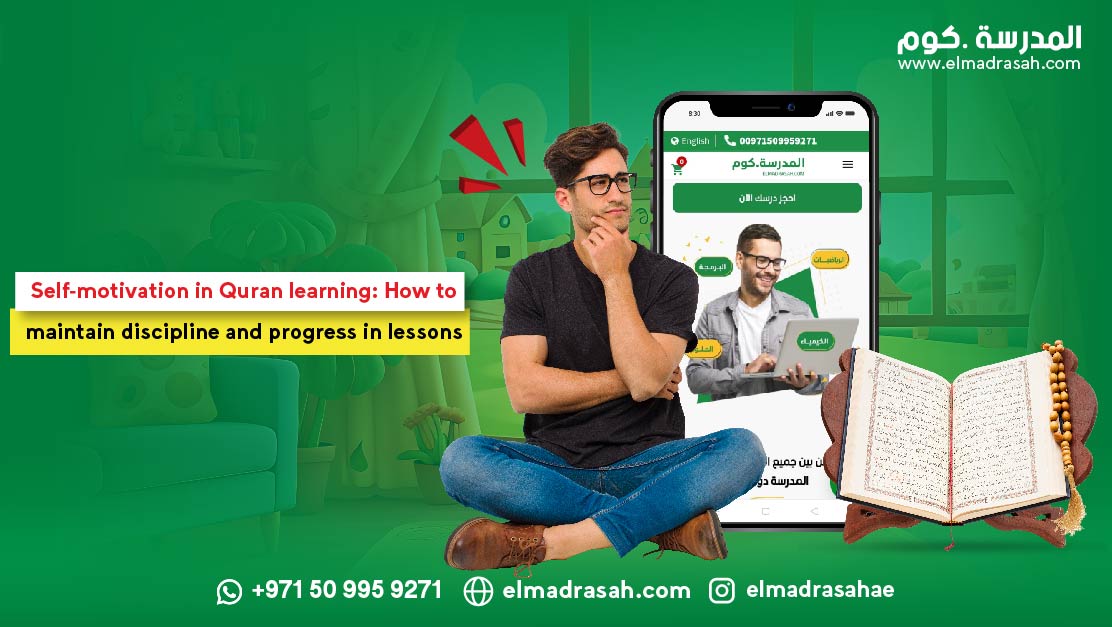
One of the well-known rules of successful people for learning anything, no matter how difficult it is, is discipline to progress in the learning process. It is natural that in the beginning the process will be difficult and not at all pleasant for yourself. You will find many difficulties that often frustrate you even if you are passionate about what you do, for this reason. At this stage in particular, the goal and surrender are often abandoned, and unfortunately many people do not suffer from this when learning the Quran, but this stage is an essential part of the learning stage that we all go through, but not all of us have the same reaction, as many are determined to reach it and in the end we must And he will reach and achieve his goal, but what is different about this person and one of the most important factors that helps you to continue is self-motivation in Quran learning, but how can we motivate ourselves self-motivation and are there other factors that help with discipline and progress in learning? This is what we will know in our article, So follow us.
Tips for Learning the Holy Quran
Learning the Holy Quran is one of the great tasks for which God rewards the one who performs it with a great reward. Despite the great status of this task before God and the Muslims, many people find it difficult to learn the Holy Quran from Arabs or non-Arabs, so they give up halfway, and we cannot say that they are wrong. Or they are negligent, but in reality there are many reasons why learning the Holy Quran is not an easy task, including:
For children
- Arabic: Speaking and reading Arabic may be difficult for children who are not native Arabic speakers. Non-Arabic speaking children need to learn letters, vocabulary, grammar and morphology.
- Ability to concentrate: Children have difficulty paying attention for long periods and focusing on learning the Qur’an. Learning the Holy Quran requires concentration and distraction and other preoccupations.
- Deep Understanding: Deeply understanding and interpreting the meanings of the Qur’an can be a challenge for children. They may need help understanding the stories, symbolic meanings, and morals contained in the Qur’an.
For teenagers
- Time and other commitments: Teenagers may have many other commitments such as school, social activities, and sports. They may find it difficult to allocate enough time to learn the Holy Quran.
- School pressures: Teenagers can have pressure from school, exams and homework, making them feel that learning the Qur’an is an additional difficult task.
- Culture and Social Challenges: Teenagers may be exposed to social and cultural challenges that make them turn away from learning the Qur’an. They may feel that it is inappropriate or unpopular among their peers, especially among non-Arabs.
For adults
- Time commitments: Adults can have many work, family, and social commitments. It is difficult for them to find the right time to learn the Qur’an and continue it.
- Language and Translation: If an adult does not speak Arabic, he or she may have difficulty understanding and interpreting the Qur’an. Translation into other languages may not be accurate enough to convey all meanings.
- Mental and material preoccupation: Adults may experience mental and material preoccupation, making it difficult for them to concentrate and deeply absorb the Qur’anic content. Life pressures, professional and financial responsibilities can occupy their attention and make learning the Quran a task that requires great dedication and commitment.
For the Arabs
- The Arabic language: It is not because the Arabic language is the mother tongue that the process of learning the Qur’an is easy. Arabs may face some difficulties in understanding some Qur’anic words and expressions that may be complex and need interpretation. They may also need to learn to read with the correct intonation and the rules of intonation, in addition to the fact that the Arabic language has developed over the ages, so the Arabic language used in the Qur’an is not identical to the modern one. You will find many words and phrases that were common in ancient times but are not used now and are therefore unknown. It often needs explanation.
- Translation: As a result of the previous point, some may need to translate the Qur’an into their local language, with the differences in dialects between Arab countries, to better understand the meanings. However, the translation may not be accurate enough to convey all the linguistic and cultural dimensions and concepts found in the Qur’an, or explain a concept according to a certain time period.
- Interpretation: Understanding the interpretation of the Qur’an and dealing with symbolic texts and deep meanings can be a challenge for Arabs. They may need to study and know interpretations and scholarly sources to better understand the Qur’an.
For non-Arabs
- Arabic language: Quranic Arabic is considered a strange and unfamiliar language to non-Arabs. They often face difficulty in learning letters, vocabulary, grammar rules, and morphology. It is known that the Arabic language is one of the most difficult languages in the world in terms of grammar and letter sounds, which is difficult for a non-Arab to learn the correct way out.
- Pronunciation and Tajweed: Correct pronunciation and Tajweed of the Quran can be a challenge for non-Arabs. They may need practice and training to acquire correct pronunciation and reading intonation, thus using sounds and letters according to the correct intonation and grammar rules, in addition to correct formation in various sentence positions.
- Cultural Understanding: Non-Arabs can have difficulty understanding some of the cultural and historical concepts related to the Holy Quran. They may need to study and learn about Islamic culture to understand the Qur’an more deeply.
The cultural and social challenge is considered the most difficult challenge that non-Arabs may face due to the difference in perspective and cultural and social aspects in their local communities that may make it difficult to learn the Holy Quran. They may feel stressed, isolated, or socially pressured by a difference in religion or culture, or simply unable to understand.
Tips that help in overcoming Quran Learning difficulties
Therefore, learning the Holy Quran poses a challenge to learners, whether children or adults, Arabs and non-Arabs. However, learning the Holy Qur’an has become a common thing recently, whether they are children or adults, Arabs and others. Therefore, there are some tips that help greatly in overcoming these difficulties, Of which:
- Study the Arabic language in detail: Learn the Arabic language to better understand the Quran. You can start by learning letters, basic vocabulary, and grammar and morphology. You can use educational resources such as books, websites, and apps to learn the language.
- Reading and understanding the interpretations: Use the approved interpretations to understand the meanings of the Qur’an and interpret it. You can read contemporary interpretations that explain the verses in an understandable and contemporary way. You can also seek the help of interpreters who have experience and knowledge in this field.
- Communicate with the Arab and Islamic community and follow their customs and culture: You can communicate with the Arab and Islamic community in your area to understand the culture, traditions, and concepts related to the Qur’an. You can attend lectures, seminars and participate in cultural events to learn about Islamic culture in depth.
- Taking advantage of digital resources: There are many digital resources available online that aim to teach and explain the Qur’an in simplified and understandable ways. Look for mobile apps, websites, and forums that provide high-quality educational resources.
- Patience and persistence: Understanding the Qur’an and overcoming linguistic and cultural difficulties requires patience and persistence. Don’t expect to understand everything at first, but take small steps and continue learning and studying the Quran regularly.
- Listen to audio recitations: Listen to recitations of the Holy Quran from professional and experienced reciters. You can listen to audio recitations online or through dedicated applications. This will help you improve your listening skills, pronunciation, and understanding of the verses.
- Work in order: Organize the study of the Holy Quran gradually and systematically. Start by learning the letters, intonation, and basic grammar rules, then read and interpret the verses slowly and gradually. Don’t rush into complex topics before you understand the basic concepts.
- Participate in lessons and courses: Join educational lessons and courses dedicated to understanding the Holy Quran. You can join group lessons in mosques or enroll in online courses. This will provide you with an opportunity to interact with specialist teachers and network with your classmates.
- Benefit from diverse sources: Diversify the sources you use to learn the Holy Quran. In addition to interpretations and audio recitations, you can read books and articles specialized in Qur’anic sciences and interpretation. Use various resources to expand your knowledge and understanding of the Qur’an.
- Continue to apply: Apply what you learn from the Holy Quran in your daily life. Try to apply Islamic values and morals in your dealings with others and in your daily behavior. This will help you enhance practical communication with the Qur’an and transform knowledge into real experience.
We fully understand that the process of learning the Holy Quran and overcoming linguistic and cultural difficulties requires time and effort. It can be tiring and frustrating at times. However, here are some tips that can help you overcome this feeling:
- Set small goals: Try to set small, tangible, achievable goals. Instead of looking at the issue as a whole, look at the small steps you can take right now. For example, start by learning one letter or simple grammar rule, and then build on it.
- Enjoy the process by discovering the methods that suit you in learning: Try to enjoy the process of learning the Holy Quran instead of focusing only on reaching the final goal. Embrace the opportunity to discover new knowledge and think about complex verses and concepts. Look for the inspiring and spiritual aspects of your experience, and you can always benefit from changing the methods you use to find ones that suit you and that you enjoy.
- Balance between academic achievement and practical work: It may be difficult to commit to studying the Holy Quran intensively over time. Try to find a balance between academic achievement and your daily responsibilities. You can set aside a specific time per day or week to study and meditate on the Qur’an.
- Look for support and encouragement: Don’t hesitate to look for support from friends, family or the local community. You can join study or discussion groups of the Holy Quran where you can share challenges and benefit from the experiences of others.
- Rest and relaxation: Do not forget the importance of rest and relaxation. Take a break when it feels stressful and give yourself time to relax and rejuvenate. Good and healthy rest helps you return with new energy and enthusiasm to continue studying.
Remember that everyone progresses at their own pace in learning the Holy Quran. Don’t compare yourself to others and keep the focus on your personal journey. It may take a long time to make progress and improvement, but persistence and dedication will pay off in the long run. Remember that every small effort you make in understanding the Holy Quran brings you closer to the ultimate goal and enriches your knowledge and spirit.
Do not despair, as learning the Holy Quran is an ongoing spiritual and educational journey. With patience and diligence, you will begin to notice improvement and enjoy deeper understanding of Allah’s words and benefit from His wisdom and guidance.
Applying self-motivation in Quran Learning Lessons
Self-motivation in Quran learning plays a crucial and essential role in the journey of learning the Holy Quran. Because the process of learning the Holy Quran is rather long, you will need to master self-motivation in Quran learning and apply it throughout your journey. Here are some of its importance:
- Continuity: The Holy Quran Learning requires continuous time and effort. Learners may encounter challenges and difficulties along the way. Self-motivation in Quran learning helps enhance continuity and determination to overcome these challenges and continue studying and improving.
- Deep Engagement: When you enhance your self-motivation in Quran learning, you engage more deeply in the learning process. A strong desire arises to explore more verses and concepts and understand them more deeply. This deep engagement helps you better absorb knowledge and apply it in your daily life.
- Achieving goals: Applying self-motivation in Quran learning helps you set goals and strive towards achieving them. You may have goals related to memorizing certain parts of the Qur’an, understanding the rules of Tajweed, or reading interpretations. With self-motivation, you are able to stay on track and work hard to achieve those goals.
- Overcoming Obstacles: On the journey of learning the Holy Quran, you may encounter obstacles such as time pressures, language challenges, or feelings of frustration. Self-motivation helps you overcome these obstacles and continue learning despite them. You can remind yourself of the spiritual and cultural importance of the Holy Quran and how it positively affects your life.
- Satisfaction and fulfillment: When you have a great deal of self-motivation in Quran learning, you feel satisfied and fulfilled when you achieve progress in learning the Holy Quran. You feel proud and self-confident when you overcome challenges and achieve the results you seek.
Boosting self-confidence: Self-motivation in Quran learning helps you build self-confidence regarding learning the Holy Quran. When you can make progress and achieve the goals you set for yourself, your sense of ability and competence is enhanced. Self-confidence increases your desire to explore more advanced Quranic topics and challenges.
- Enhance dedication and hard work: Self-motivation in learning the Holy Quran encourages you to be dedicated and hard-working in learning the Holy Quran. When you are passionate and committed to continuous improvement, you are prepared to invest the necessary time and effort. Self-motivation allows you to become more immersed in lessons and exercises, leading to deeper and more effective learning.
- Developing independence: Self-motivation in learning the Holy Quran helps you develop independence in learning the Holy Quran. When you are able to motivate yourself, set your own goals and organize your time, you are more able to explore topics on your own and gain knowledge independently.
- Enhancing enjoyment and desire to learn: Self-motivation in Quran learning contributes to increasing enjoyment and desire to learn the Holy Qur’an. When you are motivated and dedicated to achieving your Quranic goals, you will find yourself enjoying the learning process more. This stimulation creates an evolving cycle in which enjoyment feeds from stimulation, and stimulation feeds from enjoyment.
- Continuing learning in the long term: Self-motivation in Quran learning helps you continue learning the Holy Qur’an in the long term. When you have this ability to motivate yourself, you build a strong learning habit and make it a part of your daily life. This motivation helps you continue studying the Qur’an whenever you have the opportunity and in different circumstances.
In general, self-motivation in Quran learning helps you build a positive internal wave that pushes you to learn and continually develop in understanding the Holy Quran. You can enhance self-motivation by setting goals, maintaining a positive response to academic achievement, creating an appropriate environment for learning, and maintaining a balance between seriousness and enjoyment of the learning process. It may also help to find inspiration and support, such as participating in Quran recitation lessons or joining a study group with other people.
If you continue to feel tired and frustrated, it may be a good idea to consider getting additional support from a qualified teacher or Quranic mentor. They can provide the necessary guidance and direction to help you overcome challenges and make progress.
Self-motivation in Quran learning with elmadrasah.com
At elmadrasah.com, the first Arab platform for teaching the Quran, which uses modern methods to teach the Quran in the easiest ways and applies self-motivation in Quran learning, including:
- Online Learning: The Madrasa.com platform provides online educational courses that enable students to access diverse and innovatively designed educational materials. Lessons are provided by qualified teachers who specialize in teaching the Qur’an and applying self-motivation in Quran learning.
- Live interaction technologies: The platform uses live interaction technologies such as group lessons via virtual classes, audio and video chats to enable direct interaction between the teacher and students. This helps encourage communication and exchange of ideas and inquiries.
- Evaluating and monitoring performance: The platform provides a system for evaluating and monitoring students’ performance in learning the Quran. Detailed reports and statistics are provided for students and parents to track their progress and identify areas that need improvement.
- Motivation and rewards: The platform relies on motivation and reward mechanisms to enhance motivation and self-motivation among students. Certificates, recognition stages, and additional rewards are awarded to students who make progress and excel in studying the Quran.
- Diverse educational resources: The platform offers a wide range of diverse educational resources, such as educational videos, summaries, audio recitations, interpretations, and related websites. This allows students to explore the material systematically and appropriately for their level and needs.
- Communication and community participation between students and teachers: The platform encourages communication and community participation by creating an online community where students can interact with each other and share experiences, problems, and ideas. Activities, competitions and discussions are organized to enhance communication and team spirit.
- Diverse curriculum: The platform offers a diverse curriculum that includes various aspects of studying the Qur’an, such as recitation, Tajweed, interpretation, and Sharia sciences. Comprehensive and diverse educational materials are provided to ensure that students acquire comprehensive skills and knowledge of the Quran.
- Personalized learning: The platform is concerned with meeting the needs of individual students and developing a personalized educational plan for each student. The student’s level and needs are assessed and educational materials appropriate to his current level and challenges are provided, and self-motivation in Quran learning techniques are provided.
In addition to our many courses for different students of different ages and levels, Arabs and non-Arabs, and providing the easiest methods that suit everyone, through our professional teachers who rely mainly on self-motivation in Quran learning journey.
In the end, self-motivation in Quran learning process is the primary key to learning effectively and sustainably. Which helps you continue your educational journey and overcome the challenges you may face. It may also be useful to look for additional sources of inspiration and encouragement, such as listening to inspiring Quranic sermons and lectures, and connecting with other people interested in learning the Quran to share experiences, motivation, and provide mutual support. This is what you will find in the family elmadrasah.com, therefore we are here waiting for your join.















